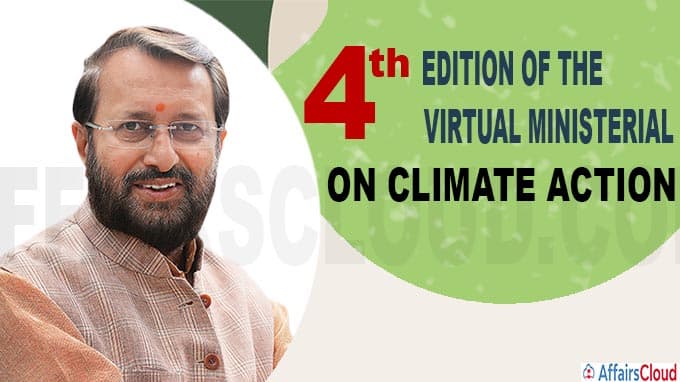
- The purpose was to ensure the continued climate action by countries with regard to the Paris Agreement under the United Nations Framework Convention on Climate Change (UNFCCC) and to exchange views on how they are aligning economic recovery and political commitment for the same.
- The session was chaired by European Commission’s Executive Vice-President Frans Timmermans, the Canadian Minister for Environment and Climate Change Jonathan Wilkinson and China’s Minister for Ecology and Environment Huang Runqiu.
- Participants: It was attended by Ministers and representatives from over 30 countries including Ministers from G20 (Group of Twenty) countries and other key parties in the UN climate negotiations.
Developed nations’ Target of USD 1 tn funding by 2020 for developing nations is not achieved yet
In 2009 at 15th Conference of the Parties (COP 15) in Copenhagen, Denmark, developed countries committed to a goal of mobilizing jointly USD 100 billion per year (USD 1 trillion) by 2020 as climate finance to address the needs of developing countries regarding strengthening of climate actions but as of now, this promise has not been mobilized.
Efforts taken by India for combating climate change
India with total forest and tree cover of 8,07,276 sq. km, which is 24.56% of the total geographical area of the country has made the following efforts for combating climate change:
- India has achieved a reduction of 21% in emission intensity of its GDP between 2005 and 2014, thereby achieving its pre-2020 voluntary target.
- India’s renewable energy installed capacity has increased by 226% in the last 5 years which is more than 87 Gigawatt (GW).
- The share of non-fossil sources in installed capacity of electricity generation increased from 30.5% in March 2015 to 37.7% in May 2020.
- India has set the aspirational target of increasing renewable energy capacity to 450 GW by 2030.
- 80 million LPG (Liquefied petroleum gas) connections provided in rural areas.
- More than 360 million LED bulbs have been distributed under UJALA scheme, which has led to energy saving of about 47 billion units of electricity per year and reduction of 38 million tonnes of carbon dioxide (CO2) per year.
India’s efforts towards cleaner fuel
-India has shifted from Bharat Stage-IV (BS-IV) to Bharat Stage-VI (BS-VI) emission norms from April 1, 2020 which was earlier to be adopted by 2024.
-India had levied a coal cess of Rs 400/ per tonne as, which is now subsumed under Goods and Services Tax(GST) as ” GST Compensation Cess”. The coal cess is levied to discourage coal consumption by increasing its cost.
-Under Smart Cities Mission, first-of-its-kind initiative – Climate Smart Cities Assessment Framework (CSCAF) 2019 has been launched to provide a clear roadmap for cities and urban India.
About United Nations Framework Convention on Climate Change (UNFCCC):
Secretariat (UN Climate Change)- Bonn, Germany
Executive Secretary (Secretariat Head)– Patricia Espinosa
Parties– 197 (as on 2015)